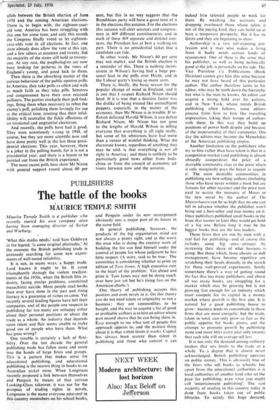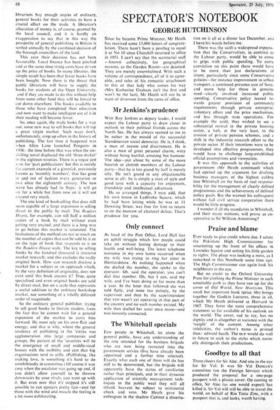PUBLISHERS
The battle of the books
MAURICE TEMPLE SMITH
Maurice Temple Smith is a publisher who recently started his own company after having been managing director of Secker and Warburg.
`What this studio needs.' said Sam Goldwyn in the legend, 'is some original platitudes.' At the moment the British publishing trade is anxiously searching for some new experi- ments of well-tested reliability.
It is not, in many ways, a happy trade. Lord knows it ought to be. It came triumphantly through the violent readjust- ments of the 1950s, when the British film in- dustry, facing similar problems, committed masochistic suicide. More people read books than ever have done in the past and rising literacy is a guarantee of riches to come. Yet recently several leading figures have left their companies, and of the people one respects in publishing far too many are unhappy either about their personal positions or about the trade as a whole. An industry that depends upon talent and flair seems unable to make good use of people who have them. What has gone wrong?
One trouble is certainly a lack of flexi- bility. Over the last decade the general publishing trade has fallen more and more into the hands of large firms and groups. This is a pattern that makes sense for educational publishing, and educational publishing is the nearest thing in books to an Australian nickel mine. When Longmans recently proposed a link between themselves and Penguin by means of that curious Looking-Glass takeover, it was not for the prospect of trading rights in novels. Longmans is the name everyone educated in this country remembers on his school books, and Penguin under its new management obviously sees a major part of its future in the same field.
In general publishing, however, the products of the big organisation mind are not always a pretty sight, and at the worst the man who is doing the creative work of building the list can find himself under the control of people for whose judgment he has little respect. (A story, said to be true: The committee is considering whether to print an edition of Tom Jones. A high executive cuts to the heart of the problem: 'Go ahead and print it. Tom Jones may not be doing much over here just yet but he's rising fast on the American charts.') One theory of publishing accepts this position and even revels in it. On this theory you do not need talent or originality to run a business: they are commodities to be bought, and the way to acquire a list of good or profitable authors is to hire an editor whose past record shows that he can bring them in. Easy enough to see what Sort of people this approach appeals to, and the nastiest thing about it is that within limits it works. Capital has always been scarcer than talent in publishing and those who control it can
indeed hire talented people to work for them. By watching the accounts and dropping overboard those whose talent is not of the paying kind, they can build up at least a temporary prosperity. But it has its limits and they are beginning to show.
Authorship is a very self-exposing pro- fession and a man who makes a living from it badly needs certain kinds of reassurance. One of these is the sense that his publisher, as well as being technically good at the job. is personally on his side. The Vice President i/c Publications (Book Division) cannot give him this sense because he may not have heard of this particular author. The author therefore turns to his editor, who may be tenth down the hierarchy but who is the man he knows. An editor can acquire a strong hold over his authors, and in New York, whose trends British publishing often follows, some editors process from firm to firm like travelling impresarios, taking their troupe of authors with them. In this way they build up positions of power both despite and because of the impersonality of their companies. One day the editors may become the Mamelukes of the American publishing empire.
Another limitation on the publishers who try to hire rather than have talent is that in a competitive market (and publishing is almost absurdly competitive) the price of a desirable commodity rises to the point where it only marginally pays the buyer to acquire it. The most desirable commodities in publishing are best-selling authors (including those who have never written a book but are famous for other reasons) and the price now paid to secure the memoirs of Moses or
the new novel by the author of The Masturbators can be so high that no one can tell in advance whether the publisher won't
bring out a best-seller and lose money on it. Once publishers published small books in the hope that sooner or later they would get hold of a big one. Before long it may be the biggest books that are the loss leaders.
Those firms that are run by men with a real feel for publishing—and of course this includes some big ones—prosper by increasing their share of what business is going. But those which, from obesity or dull management, have become repetitive are scratching their heads dismally in the search for those well-proved experiments. Surely somewhere there's a way of getting round the fact that too many publishers, and above all too many books, are struggling for a market which may be growing but is not growing fast enough for an industry which must compete for its capital in a money market where growth is the first aim. It is natural for a good publishing house to grow: business tends to concentrate in those firms that are most energetic; but the trade, taken in total, can only grow as fast as the public appetite for books grows, and the attempt to promote growth by publishing more and more titles every year only ensures that each title will on average sell less.
It is not only the demand among ordinary readers that sets limits to the trade as a whole. To a degree that is almost never acknowledged, British publishing operates on public money. This is obviously true of the firms who sell books to schools; but apart from the educational authorities it is local authorities of another kind who set the pace for publishing, even what you might call 'entertainment publishing'. The vast majority of reading in this country today is done from books taken out of public libraries. To satisfy this huge demand,
librarians buy enough copies of ordinary, general books for their activities to have a crucial effect on the trade. A librarian's allocation of money is, of course, granted by the local council, and it is hardly an exaggeration to say that in this way the prosperity of general publishing in Britain is settled annually by the combined decision of the borough councillors of the land.
This year their decision has not been favourable. Local finance has been pinched and at the same time rising costs have driven up the price of books. In many libraries, the simple result has been that fewer books have been bought. Now there is the threat that public librarians will have to supply the books for students of the Open University, and if they are made to do this without help
from some other fund they will be forced to cut down elsewhere. The books available to
those who have completed their education and now want to make intelligent use of it in their reading will become fewer.
So, once again, the trade looks for a way out, some new way to sell books that will tap a great virgin market. Such ways don't, unfortunately, crop up often in the history of publishing. The last time it happened was when Allen Lane launched Penguins in 1936: the time before that was when the six- shilling novel displaced the old 'three-decker' in the eighteen-nineties. There is a vogue just novv for 'part publications' but this is merely the current example of a gimmick, previously known as 'monthly numbers', that has gone
in and out of fashion every generation or two since the eighteenth century. The new
wave has already had its flops: it will go on for a while but from now on it will not expand very much.
The one kind of bookselling that does still seem capable of a large expansion is selling direct to the public by mail. The Readers Digest, for example, can sell half a million copies of a book by mail without even getting very excited, and there is a long way to go before this market is saturated. The limitations of the method are not so much on the number of copies that can be sold by it as on the type of book that responds to it on the Readers Digest scale. The key to selling books by the hundred thousand is intensive market research; and this excludes the really original book. How can research disclose a market for a subject or an approach which, by the very definition of originality, does not exist until this book creates it? True, quite specialised and even original books are sold by direct mail, but on a scale that represents a useful addition to the ordinary bookshop market, not something of a wholly different order of magnitude.
So the ordinary general publisher, trying to sell good books to literate readers, faces
the fact that he cannot wait for a general expansion of the market to carry him forward. He must rely on his own flair and energy; and that is why, where the general tendency of publishing in the 'sixties was agglomeration into large companies and groups, the pattern of the 'seventies will be the emergence of small and middle-sized houses with the mobility and zest that big organisations tend to stifle. (Publishing, like making love, is something it's hard to do uninhibitedly in committee.) Of course it was cosy when the escalator was going up and, if you didn't allow yourself to be thrown downstairs by your rivals, you went up with it. But even now that it's stopped it's still possible to run upstairs pretty fast—and for those with the wind and muscle the feeling is a lot more exhilarating.































 Previous page
Previous page